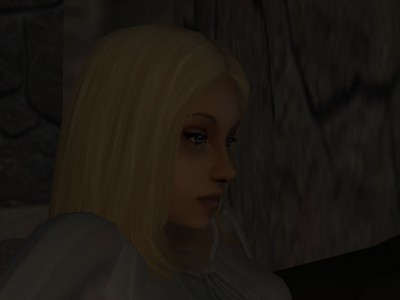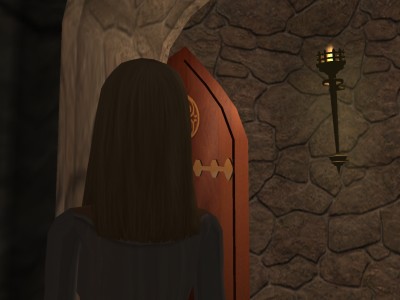
Iylaine woke in a sweat. She saw that her fire had nearly burned out, but her room was stifling. The air was so hot and heavy that it required an effort to drag it into her lungs. She threw off the blankets and stood, but it scarcely made a difference. The air did not cool her.
She tried to listen with her keen ears, but the stone walls of the windowless room seemed to shut out the world. She tried to smell the danger that was causing her heart to pound, but the air was as stationary as a block and brought her no odors. She could smell only her own sweat, and it was a sweat of… not of fear. It was something she did not recognize. But her heart pounded as if she were afraid.

There were no windows in her room, but she could hear the rain falling steadily on the wooden roof. The rain was what she needed – the cold November rain that would wash the sweat from her face and cool her body. Outside there would be a wind, and outside she would be free to move. She would not be trapped in a hot, airless, windowless, skyless room. She could breathe and smell and hear – and run, if need be.
She went out into the corridor, but the air was stifling there too. Her ears told her that no one was about. Her bare feet made no sound that men could hear.

She took the narrow stairs that led into the southern gatehouse and the barracks where the guards slept. She could hear their snoring and even their heavy breathing, which was as loud as a snore to her.
There would be guards in the gate, of course, but she hardly thought of them. She slipped past the doors of the little rooms where they slept, and no one woke. She slipped out into the gatehouse, and the two guards who sat dicing did not look up at her. She slipped out the door and into the gate, and the guard who stood outside did not see her. She walked boldly out into the gate, her bare feet slapping softly against the wet flagstones, but he did not hear.
She was outside, but the castle still pressed her round. She felt all its weight as if she carried it on her back. She walked into the mud of the outer bailey and lifted her face to the rain. It was cold, and the drops fell fast and stung her cheeks.
Still, she felt hot, stifled, and the outer walls still closed her in. She saw that she needed to be in the forest, where the rain would come filtering through the branches, and the drops would fall soft and slow and caress her cheeks like hands. She needed to be out of the muck of the court and in the forest, where the earth was carpeted with a smooth mat of fallen leaves. The walls and the mud and the raw rain were for men.
She walked unchallenged through the outer gate and was soon in the forest and on the paths she knew. Her nightgown was soaked through and clung to her skin, the ends of her hair dripped like the bare branches, but for the first time in her life she welcomed the wet. She was growing cooler now and could breathe.
She soon reached the road and crossed it unseen. Then she was in Selwood.
She had not come since the fire, though Malcolm had often urged her. He had been right – the forest was healing. The brush, the little trees, and the low branches were gone, but the ancient trunks still towered over her like pillars supporting the sky, and all around small clusters of dead fireweed and horsetails had thrown off the blanket of fallen leaves. Their stems were brown and sodden now, but they proved that the forest had been green over the summer, and the leaves hid many other scars.
With the dense brush burned away, there were no longer paths nor need for paths. All the forest was open to her, and yet she walked as if she followed a hidden trail, like the ants who followed after one another on a tortuous, invisible route rather than walking straight to their goal. Neither she nor the ants knew the goal, but put their faith in the path.
She walked back to where the forest begin its rise to the foothills, which were steep in this part of the valley. Here massive boulders of dark stone had shrugged themselves up through the earth while the earth was yet young. Now they were greenly furred with moss and ferns, and sometimes split by the roots of intrepid trees that had wedged themselves into the cracks and hollows that had, over the centuries, fermented their load of blown leaves into a rich, black soil.
In many places, though, the stones still reared up into sheer, blank walls, and in others they had wrenched apart the earth and filled the space with pools of dark water that were deeper than the walls were steep. Such was the small lake where Malcolm liked to swim, but now she climbed above it, mounting not only the flat, overhanging rock from which she watched him when she did not care to be splashed, but even the steep wall behind it.
There were few holds, and the stone was slippery with rain, but her small hands were stronger than a man’s and sure. Her bare toes gripped the rock like fingers. She climbed until she reached a vertical cleft in the rock through which even a man might lower himself, and she climbed down inside of it, into the dark.





It makes my heart ache when Iylaine starts craving the water. She doesn’t even understand why! It’s terribly, terribly unfair.